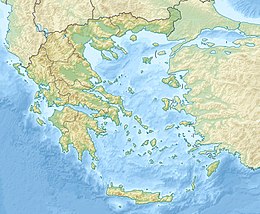The 2015 Lefkada earthquake occurred on November 17, 2015, 10:40:07 (EEST) with a moment magnitude of 6.5 located 19 km Southwest of the Greek island of Lefkada along with a depth of 11 km and intensities reaching as high as VIII (Severe) on the Modified Mercalli Scale.[2] Two people lost their lives in the event and 4–8 others were hospitalized with injuries.[3][4][1]
 | |
| UTC time | 2015-11-17 07:10:07 |
|---|---|
| ISC event | 612296376 |
| USGS-ANSS | ComCat |
| Local date | 17 November 2015 |
| Local time | 10:40:07 (EEST) |
| Magnitude | 6.5 Mw |
| Depth | 11.0 km |
| Epicenter | 38°40′12″N 20°36′00″E / 38.670°N 20.600°E |
| Fault | Hellenic arc |
| Type | Strike-slip |
| Areas affected | Greece |
| Max. intensity | MMI VIII (Severe) |
| Peak acceleration | 0.41 g in Chortata[1] |
| Landslides | Landslides hit the western coast of Lefkada Island, one of the worst was in Egremni Beach and in Gialos Beach. |
| Casualties | 2 fatalities, 4–8 injured |
Earthquake
editThe earthquake struck west of Lefkada island with initial magnitudes of between 6.3 and 6.7 however it was later settled to 6.5 according to the United States Geological Survey. The earthquake was generated by a strike-slip rupture on the Cephalonia-Lefkada Transform Fault, which also produced earthquakes in 2003 and 1973.[5] The Hellenic arc is known for its frequent seismological activity and generating historically large quakes in all of Southeastern Europe. Lefkada is located at the boundary between two geological zones, the Ionian and Paxos. This boundary runs through the western outcrops onshore the island, forming the noteworthy Ionian Thrust.[6][7][8]
Damage
editLefkada and other Ionian Islands
editMost damage was observed in western Lefkada as well ground cracks, slope movements and liquefaction found in the area. Primary effects directly linked to surface expression of the seismological source were not detected in the field. A maximum intensity of VIII was assigned areas where to large-volume slope movements occurred, along the western Lefkas coast. Intensity VIII were also assigned to the villages located in Dragano and Athani due to very heavy structural damage observed on masonry buildings, churches and other weak infrastructure mainly attributed to the combination of the recorded high PGA values, the poor anti-seismic design and construction of buildings and the geological and tectonic structure of the affected area. Damage to buildings was mainly observed in these villages arranged almost parallel to the northern segment of the Cephalonia-Lefkada Transform fault. Among not earthquake proof structures, stone masonry buildings and monumental structures suffered most damage, while the traditional buildings of the area with dual structural system and with wooden frames performed relatively well and suffered minor damage. Reinforced concrete buildings were affected not so much by the earthquake itself but was worsened with ground liquefaction.[9] Part of a harbor in Vasiliki was said to have sunk and Schools in both Lefkada and Cephalonia were forced to shut down.[10]
Egremni Beach
editA flank of the well-known pristine Egremni Beach collapsed following the massive tremor. Fortunately, the event happened on the winter months thus meaning no people were harmed. Before the earthquake occurred a cliff in the beach has been known to have been in a state of decline due to the climatic forcing resulting from previous minor seismicity and erosion.[11][12][13]
Casualties
editA 69-year-old woman died when a boulder from a loose mountain had hit her house. And an 82-year-old woman also died when a wall collapsed onto her. An estimated 4-8 people were hospitalized with further injuries.[10][14]
See also
editReferences
edit- ^ a b Papaioannou, Christos; Karakostas, Christos; Makra, Konstantia; Lekidis, Vassilios; Theodoulidis, Nikos; Zacharopoulos, Stratos; Margaris, Basil; Rovithis, Emmanouil; Salonikios, Thomas; Morfidis, Konstantinos (2018-06-21). "The November 17, 2015 mw6.4 Lefkas, Greece earthquake: source characteristics, ground motions, ground failures and structural response". 16th European Conference on Earthquake Engineering. Thessaloniki, Greece – via ResearchGate.
- ^ "M 6.5 – 19 km SSW of Lefkáda, Greece". United States Geological Survey. Archived from the original on 2019-11-11. Retrieved 2021-09-23.
- ^ "6.5-magnitude earthquake in Greece | Earth | EarthSky". earthsky.org. 2015-11-17. Retrieved 2021-09-23.
- ^ "Two dead after earthquake hits Greek island of Lefkada". CTVNews. 2015-11-17. Retrieved 2021-09-23.
- ^ "Λευκάδα 2003 | Ο.Α.Σ.Π." oasp.gr. Retrieved 2021-09-23.
- ^ Papathanassiou, George; Valkaniotis, Sotirios; Ganas, Ath; Grendas, Nick; Kollia, El (2017-01-20). "The November 17th, 2015 Lefkada (Greece) strike-slip earthquake: Field mapping of generated failures and assessment of macroseismic intensity ESI-07". Engineering Geology. 220: 13–30. Bibcode:2017EngGe.220...13P. doi:10.1016/j.enggeo.2017.01.019.
- ^ Papathanassiou, George; Valkaniotis, Sotiris; Ganas, Athanassios; Grendas, Nikos; Kollia, Elisavet (2017-03-30). "The November 17th, 2015 Lefkada (Greece) strike-slip earthquake: Field mapping of generated failures and assessment of macroseismic intensity ESI-07". Engineering Geology. 220: 13–30. Bibcode:2017EngGe.220...13P. doi:10.1016/j.enggeo.2017.01.019. ISSN 0013-7952.
- ^ Ganas, Athanassios; Briole, Pierre; Papathanassiou, George; Bozionelos, George; Avallone, Antonio; Melgar, Diego; Argyrakis, Panagiotis; Valkaniotis, Sotirios; Mendonidis, Evangelos; Moshou, Alexandra; Elias, Panagiotis. "A preliminary report on the Nov 17, 2015 M=6.4 South Lefkada earthquake, Ionian Sea, Greece" (PDF). earthquakegeology.com.
- ^ "The 17 November 2015 Mw 6.4 Lefkas (Ionian Sea, Western Greece) Earthquake: Impact on Environment and Buildings". springerprofessional.de. Retrieved 2021-09-24.
- ^ a b "Two dead after earthquake hits Greek island of Lefkada". CTVNews. 2015-11-17. Retrieved 2021-09-24.
- ^ Pappas, Gregory (2015-11-18). "Lefkada Loses One of the World's Most Beautiful Beaches in Earthquake: Dramatic Before and After Images". The Pappas Post. Retrieved 2021-09-24.
- ^ Koukouvelas, Ioannis Κ.; Nikolakopoulos, Konstantinos G.; Zygouri, Vasiliki; Kyriou, Aggeliki (2020-10-15). "Post-seismic monitoring of cliff mass wasting using an unmanned aerial vehicle and field data at Egremni, Lefkada Island, Greece". Geomorphology. 367: 107306. Bibcode:2020Geomo.36707306K. doi:10.1016/j.geomorph.2020.107306. ISSN 0169-555X. S2CID 224860022.
- ^ Nace, Trevor. "Lefkada Earthquake Destroys Pristine Greek Beach – Before & After". Forbes. Retrieved 2021-09-24.
- ^ "Tremors of Greek earthquake felt in Italy". 17 November 2015. Archived from the original on 2015-11-18. Retrieved 2021-09-24.

